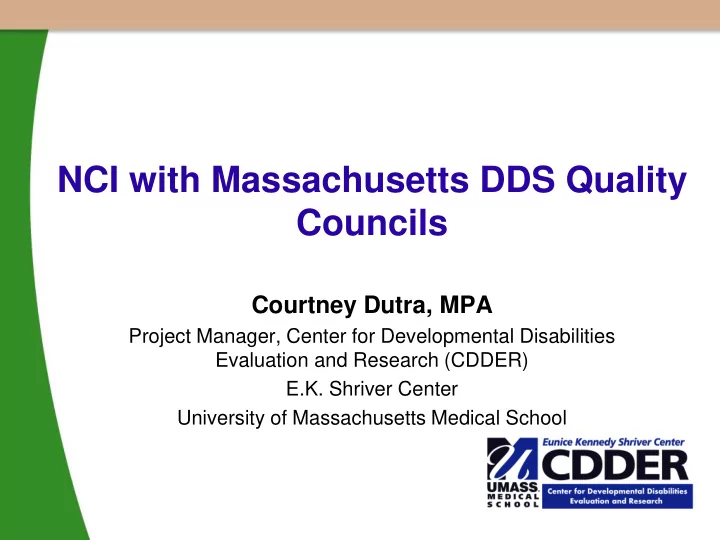

NCI with Massachusetts DDS Quality Councils Courtney Dutra, MPA Project Manager, Center for Developmental Disabilities Evaluation and Research (CDDER) E.K. Shriver Center University of Massachusetts Medical School
Quality Council Creation • Began in 2007 • DDS recognized the need to establish one group that could advise the Department about how to measure quality and where to improve services and supports. • Membership is comprised of self ‐ advocates, family members, providers and DDS staff.
Purpose of the QC • Reflect on Department priorities and help direct appropriately. • Reviews data and information to make recommendations about service improvement targets. • Monitor progress toward achieving targets.
Use of Info in the Quality Improvement Cycle Identifies area for Collected Data – like attention National Core Indicators Quality Confirm/Explore in Monitor impact Improvement other info sources Cycle or broader review Aids understanding of depth of issue, Develop & Implement and targets for Intervention action
Priority Areas • Commissioner - DDS service improvement initiatives/priority areas. • Discussion of other QC priority • The Council establishes priority areas • Self-Advocacy/Self-Determination • ER Utilization • Friendship/Recreation • Transportation • Employment • Community inclusion
How is NCI data used? • To help inform priority areas • Compliments DDS system indicators • To describe the experience of individuals in service settings • To benchmark performance against other states and the national averages.
Informing the QC Perspective Outcome DDS Data Systems NCI Benchmarking NCI Are services and supports functioning as intended?
Relationships/Friendships • DDS Outcome: People are supported to develop and maintain relationships with family and friends • Providers support people to: • Get together with family and friends when appropriate 98% • Develop appropriate social skills 100% • Develop and/or increase personal relationships and social contacts 97%
NCI Data • 80% reported having a best friend • 58% reporting talking with their neighbors at least some of the time.
Acting on the findings • Findings were presented to MA DDS’s Quality Council • This loneliness finding was an important launching ground for a multi-year social inclusion initiative. • Impact of efforts in this area are being tracked
Health and Wellness
Choice People make their own decisions
Outcomes • State-wide quality improvement initiatives • Provider-level recommendations • Service Improvement • Transportation • Inclusion of NCI in data-sharing tools: • QA Briefs • Quality Is No Accident • Quality Improvement Webinars
Challenges • Meaningful participation • Increasing membership of self-advocates • Understanding methodology behind the NCI numbers • State Rankings
Lessons Learned • Offer pre-meetings to review/discuss data • Offer remote participation options and work to troubleshoot technical problems • Logistics – alternating locations and times • Allow for evolving conversations – i.e. additional data sources, rethinking indicators • Culture of Quality Improvement
Thank you! Courtney Dutra, MPH Director, Center for Developmental Disabilities Evaluation and Research (CDDER) Eunice Kennedy Shriver Center University of Massachusetts Medical School 55 Lake Avenue North, S3-301 Worcester, MA 01655 Courtney.Dutra@umassmed.edu 774-455-6563
Recommend
More recommend